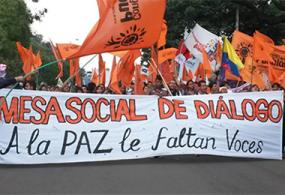A fundamental step was taken in Havana but it leaves many unresolved challenges if it intends to truly be the tipping point towards the construction of a stable and lasting peace. Sebastián Quiroga, national spokesperson of the People’s Congress proposes “a deep shift in the Colombian political dynamics” that allows for “a true democratization of the country.
By Sebastián Quiroga Pardo*. The violence that has characterized the social, political, economic, and armed conflict in Colombia has diverse causes and consequences. One of these is the inexistence of scenarios where the majorities can participate in the construction of the country. The lack of spaces of participation has generated violence, and violence itself has further closed spaces for participation and build alternatives.
Getting to know the history
The multiple wars in the 19th century, whose stories are important to know, were commanded by the elites of the liberal and conservative parties. Their peasant armies fought for control of rents and control of the land, in the midst of an empty national debate between federalism and centralism.
From the banana massacre, to the government of Álvaro Uribe Vélez and the detentions of the 11 social leaders from The People’s Congress, the era of the National Front and the long years of civil dictators, the ever-present political violence involves the masses every time more in its confrontations and it marginalizes the spaces of political participation.
In this century, the Colombian political system decided to give military treatment to protest and social struggles. They combat like enemies those who try propose by mobilization or by the ballot, the necessity to construct a sovereign, equal, and democratic country, different from what the oligarchy discusses with the north-american bosses. By doing this they have closed the paths to democratic discussion, and opened those to violence, extermination, persecution, and resistance.
For this reason, Colombia is not only a country profoundly unequal, but additionally it is a country with high levels of violence towards social leaders, union leaders, journalists, human rights defenders, and it is a country where the people do not confide, nor participate in electoral politics that are supposedly democratic.
The social and economic inequality is articulated with political inequality: only a few actors influence the direction of the country while the people are at the margins, but deeply immersed in complex situations of political, social, and economic violence. The people are persecuted, assassinated, marginalized, left without opportunities of individual and collective life and without spaces of participation.
Understanding peace and violence in Colombia has to do with this political and historical attitude of the elites. It is fundamental to find the reasons that have allowed us to pass decades and centuries of confrontation and spilling of blood.
Profound breakdown
The dialogue process that today is led by the FARC and the national government, has key challenges in this sense, involve all of the armed insurgency in a scenario of negotiation, and not of surrendering or imposition; wake up the sympathy of the abstaining people who do not trust the politics in Colombia, with many reasons not to; deactivate the war-mongering sectors of the system and dismantle their armed, military, and paramilitary apparatuses.
The major challenge to this dialogue process looking for a political solution and the construction of peace with change and social justice, is to make a profound break in the Colombian political dynamic. This break would mean opening spaces and canals for massive participation of the people, essentially to create a process of democratization. This challenge becomes more urgent with the increase in detentions, threats, and assassinations that have loomed over social leaders this year. In response to these dynamics, a group of diverse social organizations made an appeal to strengthen the participation of social sectors (http://congresodelospueblos.org/comunicados-congreso-de-los-pueblos/item/776-llamamiento-a-fortalecer-la-participacion-de-la-sociedad-en-los-dialogos-de-paz.html)
and to create a social roundtable, “to debate the problems that afflict the country, agree on efficient exits from social-political conflicts that determine the armed conflict and agree on the foundations for a democratic, just, and peaceful society.
Different sectors have said that an agreement between the guerrilla and the government would be a political revolution, however the true political revolution that Colombia needs, is to advance towards an opening that links in a massive way, the people in the process of democratic construction of a country in peace.
In the last 30 years, there have been various peace processes, some agreements signed between insurgent groups and government, and few real changes in the way in which the country is organized and constructed. Hopefully there can be a political revolution in Colombia, with widespread popular participation and in this way Colombia will contribute to peace on the continent, Latin American unity, and the dreams of a new continent.
